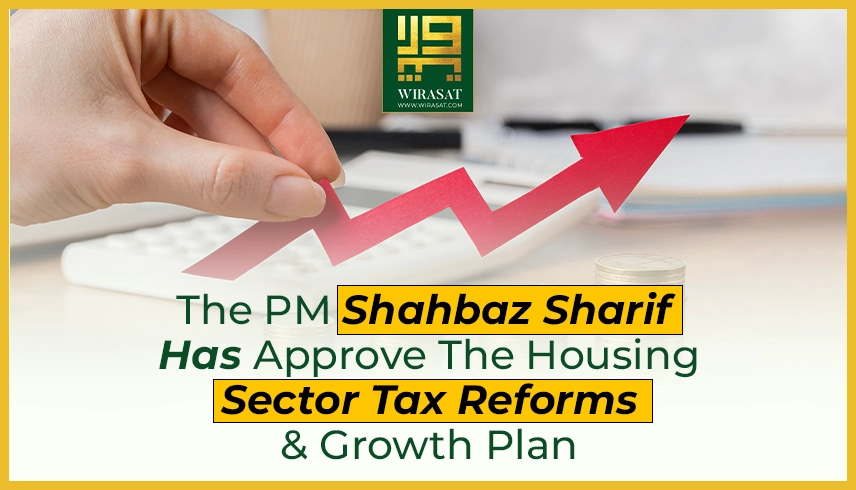The PM Shahbaz Sharif Has Approve The Housing Sector Tax Reforms and Growth Plan:
On February 6, 2025, The Prime Minister Shahbaz Sharif approved a giant policy package revamping the housing section of Pakistan in its entirety. Reducing taxes, focusing on financing access, and standardization of the policies are the best methods by which reforms suggested by the Housing Sector Task Force would enable investments and boost economic growth in this country.
It suggested waiving sub-section 2A of 236-C, implying 7E declaration & Approval of Commissioner, basic exemption for properties up to Rs 10 million, transferring non-resident verification to an online system by NADRA, and uniform rate for filers and late filers thus removing disparities.
Furthermore, the task force has recommended repeal of Section 7E of the Income Tax Ordinance, standardization and rationalization of stamp tax rates in provinces and ICT, repeal of CVT in Islamabad and introducing uniform tax policies through the National Tax Council, and wealth reconciliation waiver for investment in real estate and construction sector up to Rs. 50 million.
The task force recommends updating property valuations every three years to make them market-relevant and introducing exemptions in transaction tax for certain categories, such as low-cost housing, government plots, and first-time home buyers.
The other short-term recommendations of the task force also included lowering the policy rate to single digits; resumption of the MPMG Scheme, which would convince developers to invest again; reintroducing mark-up subsidies for low-cost housing loan; launching awareness campaigns and financial literacy programs to educate consumers; collaborating with real estate developers in developing mortgage financing options and implementing low/fixed-term loans for periods.
Key focus areas of reform packages
The forthcoming meeting under the chairmanship of the Prime Minister Shehbaz will discuss the main challenges within the housing sector concerning finalizing a growth framework to attract investment. The recommendations include:
- Amendment of S. 7E of the Income Tax ordinance to facilitate property transactions.
- Waiver of sub-section 2A of Section 236C to remove requirement of 7E declaration and commissioner approval.
- Allocating property worth less than Rs 10 million to be tax exempt for the investment in affordable housing.
- Provision for online NADRA verification for non-resident property buyers.
- Standardizing and rationalizing stamp duty across Islamabad, provinces, and the ICT.
- Abolishing Capital Value Tax (CVT) in Islamabad for the elimination of financial hurdles.
- A common tax treatment for both filers and late filers will eliminate inequality.
- Waiving wealth reconciliation requirements for investments in real estate and construction up to 50 million rupees.
- Updating valuation of properties every three years at market value.
- Providing tax exemptions for transaction taxes on low-cost housing, government plots, and first-time buyers of homes.
Short-term Revitalisation Measures for Real Estate:
The Real Estate Task Force has also recommended a set of short-term measures to boost investor confidence and catalyze growth in the real estate sector. These include:
- Reducing policy rates to a single digit for real estate financing
- Resumption of the Mera Pakistan Mera Ghar (MPMG) scheme to restore confidence in developers and buyers.
- Re-introduction of mark-up subsidies on low-cost housing loans to ease access to home ownership.
- Launching promotional awareness raising campaigns and financial literacy programs for buyers on investment opportunities.
- Maximizing collaboration with real estate developers to provide mortgage facilities for middle-income segments.
Importance of these reforms for housing sector in Pakistan:
There has been decline with wide taxation, erratic policies, and no financing options that stifle investment and slow property flows. Property transactions got decimated by over 50 percent due to the increase in taxes.
Excessive transaction costs hence encourage investors to look for alternative markets outside the country. Housing projects are being delayed because of financial challenges facing the developers. Through these reforms, the government aims to make the real estate market more transparent and stable; attract local and foreign investors; and provide affordable housing.
Conclusion:
The approval of this reform package by PM Shehbaz marks one of the most important milestones in transforming the housing situation in Pakistan. Implementation of anticipated reforms in taxation and financing, if they work, will increase the investment, enhance homeownership, and revive real estate. While the government prepares to launch the initiatives, the role of National Tax Council and provincial authorities will be critical in ensuring deeds on the ground. Further updates will be made available in the coming weeks as the process moves ahead.




